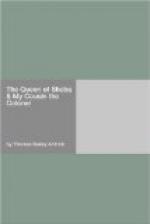When the Flagg family, consisting of father and son, removed to the South, George was ten years old and I was thirteen. It was twenty years since he and I had passed a few weeks together on grandfather Wesley’s farm in New Jersey. Our intimacy began and ended there, for it had not ripened into letters; perhaps because we were too young when we parted. Later I had had a hundred intermittent impulses to write to him, but did not. Meanwhile separation and silence had clothed him in my mind with something of the mistiness of a half-remembered dream. Yet the instant Washington Flagg mentioned his name the boyish features began rapidly to define themselves behind the maturer mask, until he stood before me in the crude form in which my memory had slyly embalmed him.
Now my sense of kinship is particularly strong, for reasons which I shall presently touch upon, and I straightway grasped my cousin’s hand with a warmth that would have seemed exaggerated to a bystander, if there had been a bystander; but it was early in the day, and the avenue had not yet awakened to life. As this bitter world goes, a sleek, prosperous, well-dressed man does not usually throw much heartiness into his manner when he is accosted on the street by so unpromising and dismal an object as my cousin Washington Flagg was that morning. Not at all in the way of sounding the trumpet of my own geniality, but simply as the statement of a fact, I will say that I threw a great deal of heartiness into my greeting. This man to me meant Family.
I stood curiously alone in the world. My father died before I was born, and my mother shortly afterwards. I had neither brother nor sister. Indeed, I never had any near relatives except a grandfather until my sons came along. Mrs. Wesley, when I married her, was not merely an only child, but an orphan. Fate denied me even a mother-in-law. I had one uncle and one cousin. The former I do not remember ever to have seen, and my association with the latter, as has been stated, was of a most limited order. Perhaps I should have had less sentiment about family ties if I had had more of them. As it was, Washington Flagg occupied the position of sole kinsman, always excepting the little Wesleys, and I was as glad to see him that May morning in his poverty as if he had come to me loaded with the title-deeds of those vast estates which our ancestors (I wonder that I was allowed any ancestors: why wasn’t I created at once out of some stray scrap of protoplasm?) were supposed to have held in the colonial period. As I gazed upon Washington Flagg I thrilled with the sense that I was gazing upon the materialization in a concrete form of all the ghostly brothers and sisters and nephews and nieces which I had never had.
“Dear old boy!” I exclaimed, in my turn, holding on to his hand as if I were afraid that I was going to lose him again for another twenty years. “Bless my stars! where did you come from?”




